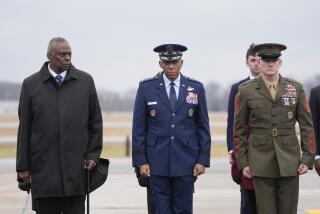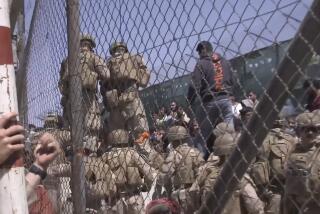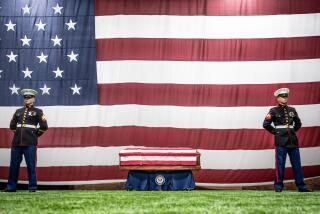Women Among U.S. Casualties in Fallouja
BAGHDAD — A suicide bomber in an explosives-laden vehicle struck a convoy carrying U.S. Marines, most of them women, the military said Friday. At least two Americans were killed.
Three other Marines and a sailor thought to have been in the convoy in the Iraqi city of Fallouja were listed as “duty status whereabouts unknown” pending identification of remains, raising the possibility that the death toll in the attack Thursday evening would rise to six. One of the confirmed dead was a woman.
At least 13 other Marines, 11 of them women, were wounded, the military said. The attack occurred days after American officials had hailed the relative quiet in Fallouja, a onetime insurgent bastion, as a sign of progress in Iraq.
A Pentagon official said the female Marine was killed in the bomb blast. The second Marine, a male, was killed by small-arms fire that was part of the attack by militants.
“Female Marines play a vital role providing security at the entry control points in the city,” the Marine Corps said in a statement. “They search female Iraqi citizens moving through the checkpoints. Female Marines are employed in this role in order to be respectful of Iraqi cultural sensitivities.”
The women involved are part of what the Marines call “lioness” teams, Pentagon officials said, a term denoting women who serve with men on occasional patrols and raids as well as at checkpoints. The sailor listed as missing was part of Navy contingents of Marine units who serve as medical and religious personnel.
Pentagon officials said the convoy was returning to Camp Fallouja after checkpoint duty in the city.
The attack appeared to be the deadliest in the area since a Marine-led assault in November ousted insurgents who had controlled the city for months. Before that incursion, Marines had had several catastrophic run-ins with suicide bombers in Fallouja, including an Oct. 30 attack on a transport truck that killed eight Marines and injured eight.
The Marines have taken great pains to prevent insurgents from reestablishing a base in the city, searching every person and vehicle that enters. Permanent residents have been given identification cards. Several thousand U.S. and Iraqi troops have been assigned to the city and posted at its entrances and exits. Fallouja had been relatively calm for months, although the military had reported several attacks on U.S. forces in recent days.
A resumption of violence in Fallouja could deliver a setback to Defense Secretary Donald H. Rumsfeld and other Pentagon officials, who have held up November’s operation as one of the positive developments in more than two years of counterinsurgency efforts.
Elsewhere Friday, a dispute between the new Transportation Ministry and the Western firm that provides security at Baghdad’s international airport shut down civil aviation in the country, company officials said.
The closure temporarily squelches one of the few economic bright spots in Iraq. Royal Jordanian Airlines flies to Baghdad from Amman 14 times a week, while regular charter flights from the emirate of Dubai have increased trade and travel between Iraq and its Persian Gulf neighbors. Iraqi Airways recently began flying between the capital and cities in northern and southern Iraq.
With armed bandits and insurgents roaming the roads, air travel has become a vital link between Iraq and the outside world.
Civilian flights across Iraq were canceled at 5 p.m. Friday after a dispute between Global Strategies Group, a London-based contractor, and the ministry. Discussions were continuing, said Giles Morgan, a spokesman for Global. In a statement, the British Embassy said it might be four days before flights resumed.
In other developments, saboteurs blew up a crucial oil pipeline leading from Kirkuk in the north to Turkey. An official with the state oil company said it would take two days to douse the flames and repair the line.
And gunmen opened fire on a Baghdad-based aide to Grand Ayatollah Ali Sistani, Iraq’s most powerful Shiite Muslim cleric. Sameer Baghdadi and two of his bodyguards were killed in a barrage of gunfire while driving in the Dora neighborhood. A third bodyguard was badly wounded.
The recent violence and deterioration in services has raised the political temperature. The capital suffered through a rash of car bombings that killed at least 40 people over a 12-hour period ending Thursday morning, as well as a water shortage that lasted nearly a week.
Shiite and Sunni Muslim clerics used Friday sermons, which had lately focused on arcane matters of theology and morality, to attack the status quo.
“Which hands are responsible for targeting the main water pump of Baghdad?” Sheik Ahmed Abdel Ghafour asked at the Sunni Umm Qura Mosque in Baghdad. “These dirty hands, if they are not cooperating with the occupiers, they are doing this because of the occupiers.”
Even Shiite clerics decried rampant corruption and incompetence in the new government, which is dominated by Shiites.
“The Iraqi government is practicing oppression against the people of Iraq,” said Sheik Aws Khafaji, a cleric in Kufa, south of Baghdad. “No one is exempted from the oppression practiced against the people of Iraq since the time of Baathists to our day.”
*
Times staff writers Mark Mazzetti in Washington and Patrick J. McDonnell in Baghdad contributed to this report.
More to Read
Sign up for Essential California
The most important California stories and recommendations in your inbox every morning.
You may occasionally receive promotional content from the Los Angeles Times.










